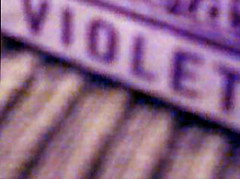Los Angeles is a strange place. We are, decidedly, a town that lives and dies by film, television, and automobiles. It's a decidedly entertainment industry town. I've lived other places (5 years in the Bay Area, brief stints in New York and Oxford) and never felt compelled to own a TV. But here in Southern California (including my suburban hometown), I couldn't imagine life without cable. As a result, I am fascinated by the writer's strike. I'm following it avidly. I've started reading the LA Times "Showtracker" blog for official news and I love Wired Magazine's Underwire blog which, among all the other things it covers, includes strike updates with writers' propaganda videos attached to the end of strike-related posts. And I must say, I've enjoyed several of the strike videos very much.
When the Daily Show and the Colbert Report came back on the air without their writers, I was profoundly disappointed that John Stewart and Stephen Colbert would cross picket lines, even though I was desperately craving their election coverage. I understand their predicament and that they might not have had much of a choice, and it was very clear that Stewart would have much preferred to make a deal with the writers giving them all their demands. I'm still very torn, but I'm watching both shows, and I have to say that I don't think they're doing too badly. The initial reviews were pretty scathing, but I must say that there's something charming about watching John Stewart trying his best and trying to have fun up there. He's a fascinating, smart interviewer and I very much enjoy him talking to authors and intellectuals - I don't miss the stars at all.
Now that the director's guild has settled, there's obviously a lot of pressure on the writers to make a deal before the Oscars, but there's a part of me that wants this strike to keep going. I want the strike to continue mostly because I think the writers are completely right, that the internet is clearly the future of television, and that the producers are trying to screw everyone else out of a fair share of the profits from the new medium. But part of me also wants to see what happens if the strike continues. Because I think there's a lot of hope out there for striking writers to change the face of the industry by working around and without the producers. There have been all sorts of rumors about writers starting their own projects, perhaps for internet distribution and it would be fascinating to see if it would be possible for some big name writers to transfer their TV and filmwriting talent to writing a high quality scripted internet content. How would it look different than TV or film content? Would it be shorter? Lower production values? What are the advantages of these formats?
I'm also fascinated by the other questions the strike raises. When the only new content on TV is reality programming, will people stop watching? Will people be cancelling cable subscriptions? Will the networks and/or the cable companies suffer? Moving Showtime content to network TV (Dexter will air on CBS in February) is a fascinating step. What else will the networks bring out of the vaults? Will we see old movies and premium cable programing in primetime? Will there be innovation, or just more of the same old reality shows? It will be a year or more until we feel the effects of the strike on films, but television will be suffering for quite a while, since already there are no pilots for next year's programming.
Of course, since this is an industry town, I know several screenwriters and aspiring screenwriters who are striking, and whose lives are profoundly interrupted as a result. For their sake, I hope business resumes soon so that they can pay their bills and so the local economy doesn't suffer more than it already has. But the strike makes very visible how the industry is changing, and I find that important and exciting.
My 2025 in Review
-
Hi Friends! Happy Holidays! Here is my 2025 rundown.
Another year of being a full time playwright! It's been about 2 and a half
years now. I feel li...
1 week ago

0 comments:
Post a Comment